The core mission of Backhaul Alaska is to provide a statewide logistical support network that bolsters and integrates with local community backhaul programs. A successful project recently carried out by the Kongiganak Traditional Council’s Environmental Department exemplifies the use of local leveraging possible with Backhaul Alaska resources.
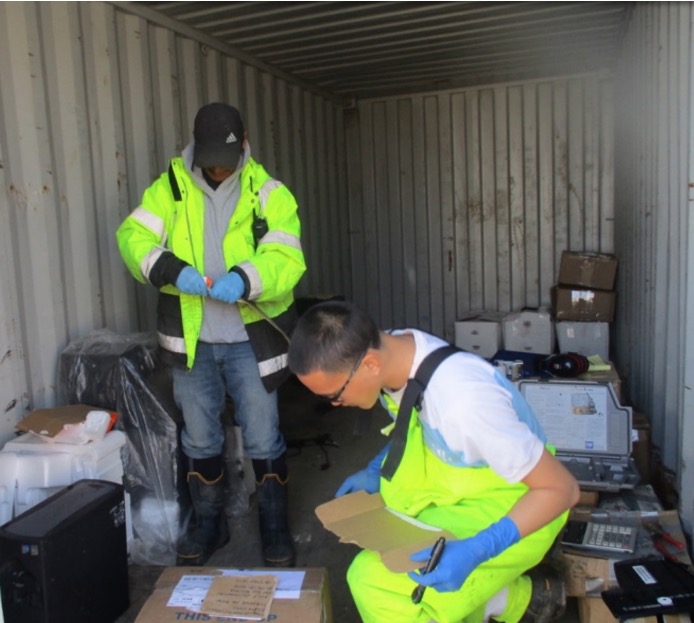
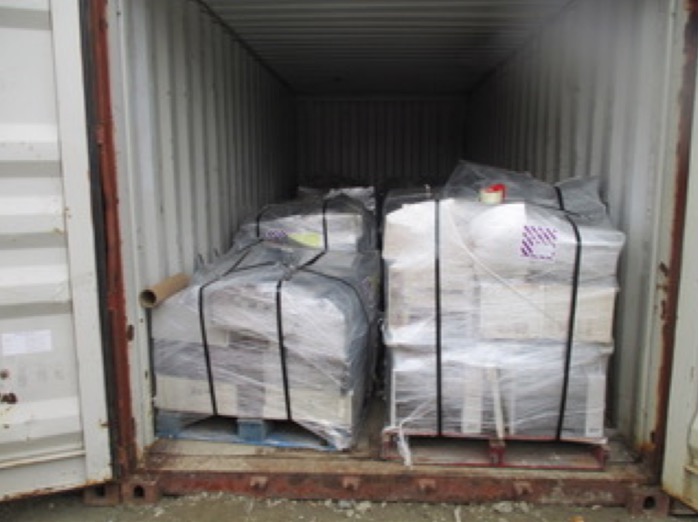
The focus on local programs is critical because each community is unique in its challenges and in its opportunities. Particular infrastructure and safety issues must be addressed, and Backhaul Alaska seeks to integrate with local projects, programs, and partners to address them.
If you are not from rural Alaska, it is difficult to imagine the large number of entities that may be involved in a single project. This story will take the time to recognize those agencies, non-profits, and companies that can integrate with community backhaul programs.
Kongiganak is a Yup’ik community of roughly 440 individuals located near the mouth of the Kuskokwim River, about 70 miles of Bethel. The tribe’s Environmental Department staffs and manages the backhaul program which employs two Hazardous Waste Technicians and two Landfill Technicians.
Year-round, these technicians collect, package, and stage backhaul items in dedicated storage connexes for future shipment. Kongiganak’s local program targets used oil in addition to the electronics, fluorescent lamps, and lead acid batteries that comprise the pilot Backhaul Alaska wastes.
Diligent records of collected and self-hauled community materials, backhaul shipments, staff training, and landfill maintenance are kept by Environmental Director Tracy Lewis. She uses these records to help with scheduling shipments, reporting, arranging needed training, and ordering supplies, among other program aspects.
Paul A. Paul, Environmental Coordinator, heads the community outreach. The Environmental Dept is educating residents to bring their hazardous waste to the backhaul shed rather than discard it at the landfill – thus preventing toxic chemicals from ultimately leaching to surrounding waters or emitting into the air through waste burning. Mr. Paul regularly makes announcements over the radio to inform community members on how to contact the IGAP Department for pickup. Tickets for quarterly raffles are given out whenever backhaul items are picked up or dropped off. Ms. Lewis correlates these outreach measures to an increased community understanding and participation.
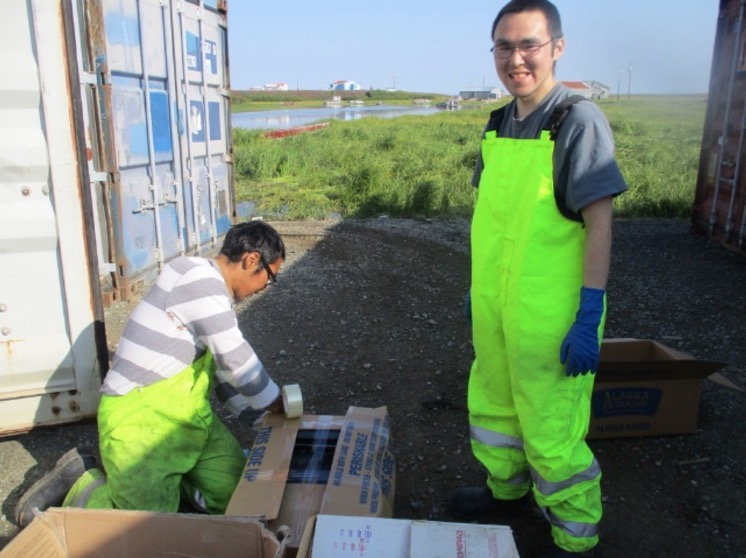
Kongiganak is in the 2nd group of pilot villages testing the Backhaul Alaska framework. While Backhaul Alaska temporarily ceased its shipping operations to safeguard community health and adhere to its system protocols, Kongiganak team continued to operate locally, and Backhaul Alaska continued its partial monthly support stipend funded by Denali Commission and US Environmental Protection Agency (EPA) Environmental Justice Program. Kongiganak in return provides the program valuable feedback about how the program is serving them and what improvements should be made.
As with the bulk of pilot villages, the Backhaul Alaska Needs Assessment that is initially performed indicated that backhaul safety gear, packing supplies, and spill kits, a storage connex were badly needed. These materials were shipped out to Kongiganak in Fall 2019 and its backhaul team has been using them ever since.
Kongiganak joined the Backhaul Alaska Program after the main Pilot 2 training event, but working with the program, they received and continue to receive training to support their local backhaul efforts in a variety of leveraged ways.
As with all Backhaul Alaska communities, Backhaul Alaska statewide and regional coordinators work closely with the Kong team in providing regular, ongoing remote training and technical assistance to Kongiganak as they build a model hazardous waste management program. This one-on one training is funded primarily by U.S. Department of Transportation’s Pipeline and Hazardous Materials Safety Association (PHMSA) and Bureau of Indian Affairs, via a Kawerak Inc. contract.
Clayton Active, Hazardous Waste Technician, was trained in backhaul skills, OSHA safety, HAZWOPER, and the five components of US DOT Hazardous Materials Regulations through Zender Environmental Health’s Rural Alaska Community Environmental Job Training Program (RACEJT). RACEJT is funded by the State of Alaska Dept of Labor and the USEPA’s Job Training Grant.
Mr. Paul and Mr. Evans received 3 days of hands-on training funded by a USDA Solid Waste Management grant awarded to Zender’s Technical Assistance program. This training was leveraged with the 2019 Bethel e-waste recycling event funded by Donlin Gold in coordination with AVCP. Lead instructors were the Statewide and Western Regional Backhaul Alaska Coordinators – Reilly Kosinski and Hazel Flynn, with Delta Backhaul, Central Recycling, and NRC/US Ecology staff providing additional instruction and demonstration at the hazardous waste event Delta Backhaul had organized.
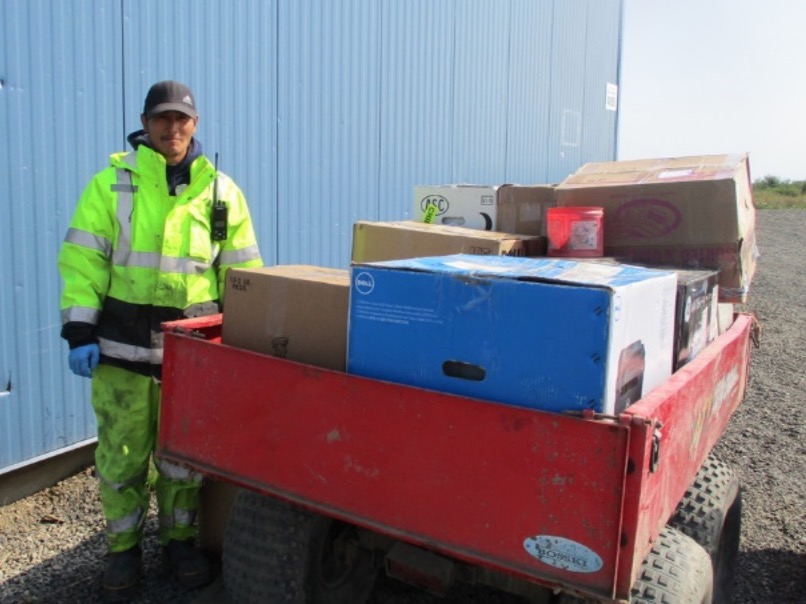
With this training and supplies, the backhaul team led by Ms. Lewis, who as with Mr. Paul, is funded through a USEPA Indian General Assistance Program (IGAP) grant, planned and executed a successful backhaul of roughly 450 lbs of mercury-bearing fluorescent lamps. Mercury is a powerful neurotoxin impacting motor skills, cognitive function, and more. It is especially harmful to children and their developing brain. The lamps were shipped for recycling via discounted shipping rates on Ryan Air to Bethel, and then on Everts Air Cargo to Total Reclaim, Inc., in Anchorage who also provided a discounted recycling rate.
The next backhaul event, carried out in August, was even larger. Kongiganak was invited to participate in a regional backhaul effort resulting in over 5,500 lbs of recyclable electronics being flown out, free of charge, on Grant Aviation to Association of Village Council Presidents (AVCP), the regional ANCSA non-profit located in Bethel. AVCP Environmental Department staff, funded also by the USEPA IGAP program were instrumental in outreach and providing a hub staging area. Kongiganak’s electronic recycling opportunity was part of the Donlin Gold Backhaul 2020 Project*, spearheaded and sponsored by Donlin Gold LLC. Donlin Gold LLC contributes substantially to the region’s backhaul successes, as it has been generously funding village backhaul events for the past 3 years, covering from 10 to 12 villages each year.
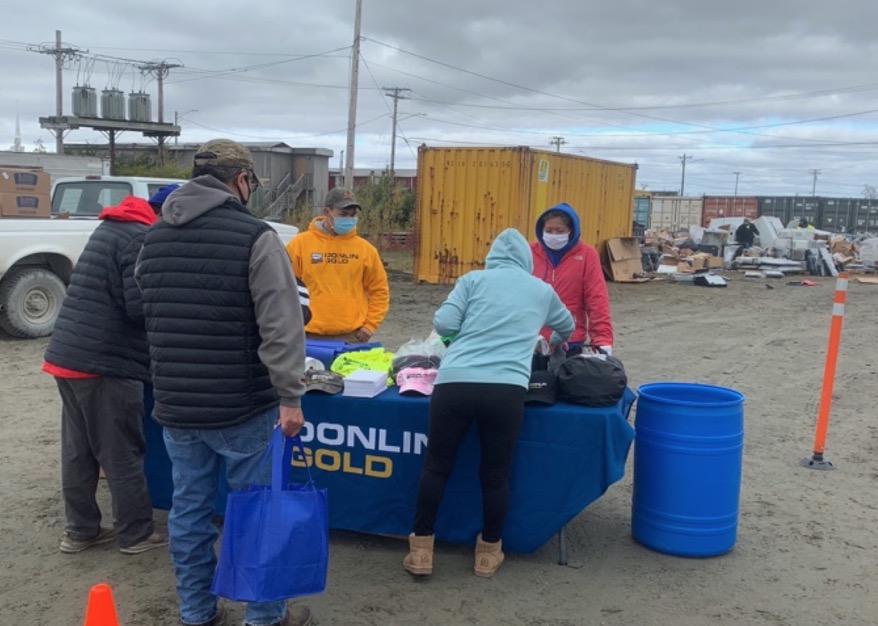
The Donlin Gold Backhaul 2020 Project funds Delta Backhaul to administer freight and recycling contracts for shipping out end-of-life electronics and other potentially harmful wastes from 10 Kuskokwim River communities to Bethel for consolidation. Additionally, with these funds, AVCP, Delta Backhaul, and other partnering organizations assist with local community collection events, providing prizes and supplies such as t-shirts and signs that help to draw community participation and awareness.
The 2020 Donlin Gold Backhaul Project culminated with a free public recycling event in Bethel in early September in collaboration with AVCP facility and staff resources (see picture inset). Delta Backhaul used Central Recycling Services to process and package materials. All collected materials were packaged and backhauled by Alaska Marine Lines, a Backhaul Alaska partner that provides discounted shipping, to the lower 48 for further processing.
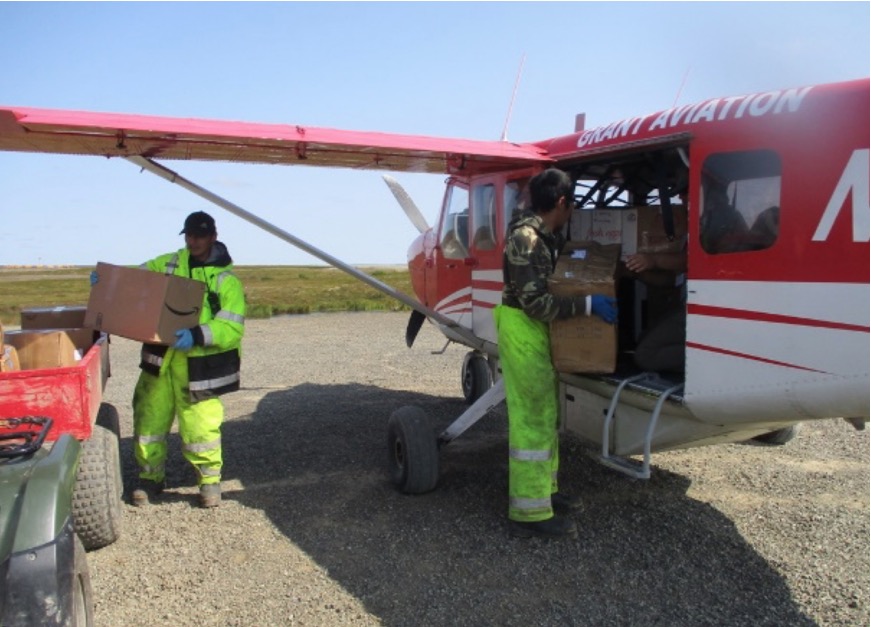
Next year holds an even busier backhaul season for Kongiganak. Through the Backhaul Alaska Pilot Program, Kongiganak will backhaul its large stockpile of 10,000 lbs of electronics and lead acid batteries. Lead acid batteries will be picked up in Seattle by the Responsible Battery Coalition, which generously covers the recycling fees and pays to Backhaul Alaska a lead core recovery revenue which goes back to the program to help cover village supplies and freight costs.
Additionally, the Environmental Department and its Backhaul Team will inventory the community’s salvage area in preparation for a future scrap metal backhaul, using technical assistance provided by the Backhaul Alaska Western and Statewide Coordinators.
Currently Backhaul Alaska Pilot Program is targeting only electronics, lead-acid batteries, and fluorescent lamps – so as to maintain tight controls on the framework testing process. These materials were selected because they comprise over 95% of the toxic heavy metals in village waste streams. But in the future, the program will slowly expand to handle a wide range of waste materials using streamlined efficiencies from improved economy of scale and coordinated logistics, while continuing to use and seek partnering opportunities like the one featured here.
Most importantly, at Backhaul Alaska’s core is the systematic support of, and reliance on, highly competent local community backhaul programs like Kongiganak’s. It is Backhaul Alaska’s goal that in ten years, every rural Alaska community will have such regularly trained staff and a safe, properly stocked, waste handling facility year-round. In this way, in addition to resident-generated waste, construction and institutional hazardous waste can be handled professionally by the communities themselves. Companies may need to cover the cost of backhauling such materials, but the Backhaul Alaska system is projected to make the venture less costly. Critically, and local hire creates jobs, boosts the local economy, and helps to meet State of Alaska resident hire preferences.
The Solid Waste Alaska Taskforce, which directs Backhaul Alaska, sees the Program and the local and regional backhaul partnering efforts with which it integrates, exemplified here by the Kongiganak’s Environmental Department’s success, as providing a “win-win” future for local communities, private and public entities, and all Alaskans alike.
*Footnote: 2020 marks the third consecutive year where Donlin Gold, LLC, in partnership with multiple tribes and other organizations, have provided a rotating set of communities in the Y-K Delta region with an opportunity to remove electronics and other potentially harmful materials. This year’s partners included entities such as AVCP, ONC, Delta Backhaul, ACC, Ryan Air, Grant Aviation, AML, Brice Inc., and Native Village of Napaimute. Further information regarding the program and partners can be found via Donlin Golds’ Facebook Page.